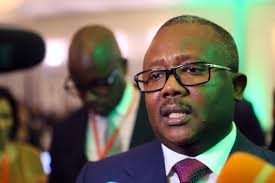
The political landscape in Guinea-Bissau has been rocked by the Supreme Court’s decision to invalidate the candidacy of Domingos Simões Pereira, a key opposition leader and head of the historic African Party for the Independence of Guinea-Bissau and Cape Verde (PAIGC), just two months ahead of the November 2025 presidential election.
The Court announced on Wednesday, September 24, that Pereira’s application was submitted outside the statutory deadline, despite the official deadline being Thursday, September 25. Officials argued that there was insufficient time to examine the documents thoroughly or notify the party of any procedural issues.
PAIGC representatives, however, insist that the papers were filed five days prior to the deadline.
Pereira, returning from a nine-month exile abroad, insisted he had complied with all requirements. “This cannot be a serious position,” he said, describing the decision as a possible “misunderstanding” and confirming that party lawyers are exploring avenues for appeal.
This marks an unprecedented moment in Guinea-Bissau’s political history: the PAIGC has never before been excluded from a presidential ballot by a court ruling.
Observers warn that the move raises serious questions about the independence of the judiciary, especially in a period of heightened political tension.
The timing has further complicated matters. The decision coincided with the nation’s 52nd independence anniversary, a public holiday when institutions were closed, leaving the party unable to lodge an immediate appeal.
With Thursday marking the official deadline for candidacy submissions, the PAIGC risks permanent exclusion from the vote.
President Umaro Sissoco Embaló, seeking a second term, now faces a significantly weakened opposition. So far, only Fernando Dias of the Social Renewal Party (PRS) remains validated, an opponent perceived as less formidable than Pereira.
Analysts warn that the exclusion could pave the way for an almost certain re-election of Embaló, deepening political instability and public mistrust in institutions.
Since 2024, public demonstrations have been banned, curbing citizens’ ability to express dissent.
Supporters of Pereira view the court’s decision not merely as a procedural error but as evidence of a judicial system increasingly influenced by the ruling power.
Meanwhile, the incumbent continues his campaign largely unchallenged, amid growing criticism of the fairness and transparency of the electoral process.



